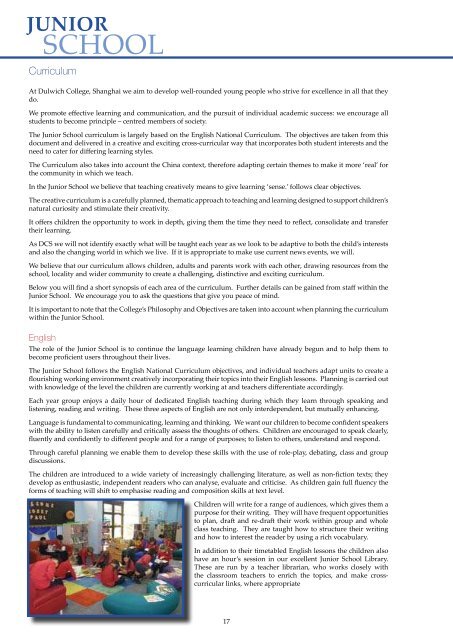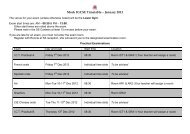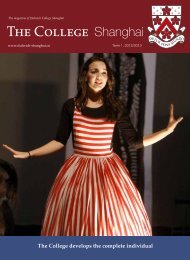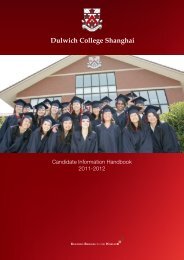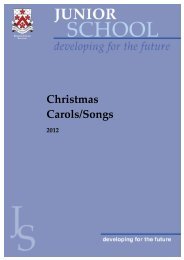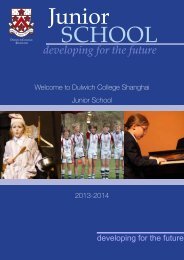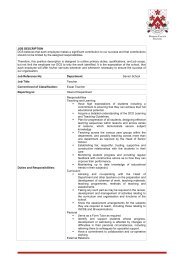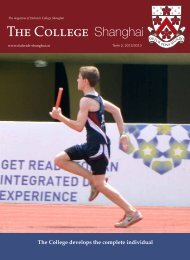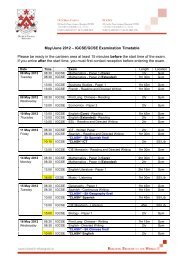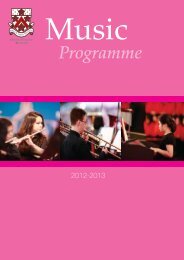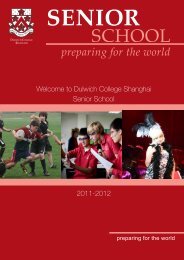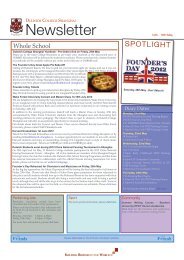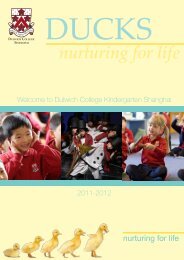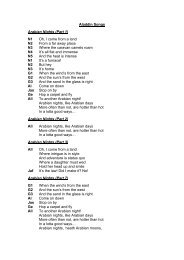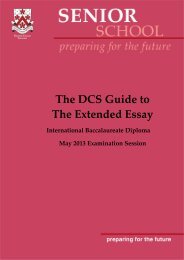developing for the future - Dulwich College Shanghai
developing for the future - Dulwich College Shanghai
developing for the future - Dulwich College Shanghai
Create successful ePaper yourself
Turn your PDF publications into a flip-book with our unique Google optimized e-Paper software.
<strong>developing</strong> <strong>for</strong> <strong>the</strong> <strong>future</strong><br />
Curriculum<br />
At <strong>Dulwich</strong> <strong>College</strong>, <strong>Shanghai</strong> we aim to develop well-rounded young people who strive <strong>for</strong> excellence in all that <strong>the</strong>y<br />
do.<br />
We promote effective learning and communication, and <strong>the</strong> pursuit of individual academic success: we encourage all<br />
students to become principle – centred members of society.<br />
The Junior School curriculum is largely based on <strong>the</strong> English National Curriculum. The objectives are taken from this<br />
document and delivered in a creative and exciting cross-curricular way that incorporates both student interests and <strong>the</strong><br />
need to cater <strong>for</strong> differing learning styles.<br />
The Curriculum also takes into account <strong>the</strong> China context, <strong>the</strong>re<strong>for</strong>e adapting certain <strong>the</strong>mes to make it more ‘real’ <strong>for</strong><br />
<strong>the</strong> community in which we teach.<br />
In <strong>the</strong> Junior School we believe that teaching creatively means to give learning ‘sense.’ follows clear objectives.<br />
The creative curriculum is a carefully planned, <strong>the</strong>matic approach to teaching and learning designed to support children’s<br />
natural curiosity and stimulate <strong>the</strong>ir creativity.<br />
It offers children <strong>the</strong> opportunity to work in depth, giving <strong>the</strong>m <strong>the</strong> time <strong>the</strong>y need to reflect, consolidate and transfer<br />
<strong>the</strong>ir learning.<br />
As DCS we will not identify exactly what will be taught each year as we look to be adaptive to both <strong>the</strong> child’s interests<br />
and also <strong>the</strong> changing world in which we live. If it is appropriate to make use current news events, we will.<br />
We believe that our curriculum allows children, adults and parents work with each o<strong>the</strong>r, drawing resources from <strong>the</strong><br />
school, locality and wider community to create a challenging, distinctive and exciting curriculum.<br />
Below you will find a short synopsis of each area of <strong>the</strong> curriculum. Fur<strong>the</strong>r details can be gained from staff within <strong>the</strong><br />
Junior School. We encourage you to ask <strong>the</strong> questions that give you peace of mind.<br />
It is important to note that <strong>the</strong> <strong>College</strong>’s Philosophy and Objectives are taken into account when planning <strong>the</strong> curriculum<br />
within <strong>the</strong> Junior School.<br />
English<br />
The role of <strong>the</strong> Junior School is to continue <strong>the</strong> language learning children have already begun and to help <strong>the</strong>m to<br />
become proficient users throughout <strong>the</strong>ir lives.<br />
The Junior School follows <strong>the</strong> English National Curriculum objectives, and individual teachers adapt units to create a<br />
flourishing working environment creatively incorporating <strong>the</strong>ir topics into <strong>the</strong>ir English lessons. Planning is carried out<br />
with knowledge of <strong>the</strong> level <strong>the</strong> children are currently working at and teachers differentiate accordingly.<br />
Each year group enjoys a daily hour of dedicated English teaching during which <strong>the</strong>y learn through speaking and<br />
listening, reading and writing. These three aspects of English are not only interdependent, but mutually enhancing.<br />
Language is fundamental to communicating, learning and thinking. We want our children to become confident speakers<br />
with <strong>the</strong> ability to listen carefully and critically assess <strong>the</strong> thoughts of o<strong>the</strong>rs. Children are encouraged to speak clearly,<br />
fluently and confidently to different people and <strong>for</strong> a range of purposes; to listen to o<strong>the</strong>rs, understand and respond.<br />
Through careful planning we enable <strong>the</strong>m to develop <strong>the</strong>se skills with <strong>the</strong> use of role-play, debating, class and group<br />
discussions.<br />
Ma<strong>the</strong>matics<br />
Ma<strong>the</strong>matics is fundamental to children’s learning and one of <strong>the</strong> core subjects in <strong>the</strong> English National Curriculum. At<br />
<strong>Dulwich</strong> <strong>College</strong> <strong>Shanghai</strong>, we follow <strong>the</strong> principles of <strong>the</strong> UK National Numeracy Strategy, which provides <strong>the</strong> key<br />
skills and objectives that we teach.<br />
Each class participates in an hour of Ma<strong>the</strong>matics per day and lessons are adapted by <strong>the</strong> children’s teacher to suit <strong>the</strong><br />
needs and interests of <strong>the</strong> class. Even within each class, different levels of work will be produced to best help individual<br />
groups of children learn.<br />
Students in <strong>the</strong> Junior School are placed into ability groups based on <strong>the</strong>ir previous year’s achievement, teacher assessment<br />
or entrance tests. There are two accelerated groups within each year group and three parallel groups. <strong>Dulwich</strong> has a<br />
vast number of gifted ma<strong>the</strong>maticians: many children in <strong>the</strong> parallel groups are still working at levels well above that<br />
expected in <strong>the</strong> English system. The groups will change throughout <strong>the</strong> year dependent on <strong>the</strong> needs of <strong>the</strong> children.<br />
To ensure your child feels confident in Ma<strong>the</strong>matics, we have a strong emphasis on thorough leaning of mental arithmetic<br />
and core skills. At <strong>Dulwich</strong> we will provide not only understanding of ma<strong>the</strong>matical processes and concepts, but also<br />
modern skills that are in high demand, such as <strong>the</strong> capability to analyse in<strong>for</strong>mation and to solve problems.<br />
ICT<br />
ICT plays an important role in <strong>the</strong> Junior School and our aim is to provide your children with <strong>the</strong> tools needed not only<br />
to continue <strong>the</strong>ir studies into <strong>the</strong> senior school, but also to prepare <strong>the</strong>m <strong>for</strong> an ever-changing world where technology<br />
plays an increasing part.<br />
The role of ICT in <strong>the</strong> Junior School is three-fold. Firstly, each class has a dedicated hour in our suite of iMacs where <strong>the</strong>y<br />
learn <strong>the</strong> basic skills outlined in <strong>the</strong> English National Curriculum:<br />
• Finding things out<br />
• Developing ideas and making things happen<br />
• Exchanging and sharing in<strong>for</strong>mation and reviewing<br />
• Modifying and reviewing work as it progresses.<br />
Where appropriate, <strong>the</strong>se are linked to topics occurring within <strong>the</strong> year group in o<strong>the</strong>r curriculum areas.<br />
Secondly, <strong>the</strong> children have access to a range of technologies in <strong>the</strong> classroom including an interactive Smartboard.<br />
Each year group also has access to a bank of 22 Apple laptops, which can be booked by teachers to support work in <strong>the</strong><br />
classroom as appropriate. This enables us to provide <strong>the</strong> children with a range of learning tools to support <strong>the</strong>ir studies<br />
and help <strong>the</strong>m to communicate <strong>the</strong>ir ideas in a variety of ways, whe<strong>the</strong>r it be through <strong>the</strong> medium of film, photography,<br />
presentations or simply written reports.<br />
Thirdly, <strong>the</strong> Junior School operates a virtual learning environment, Studywiz, which allows children and teachers to<br />
extend <strong>the</strong>ir learning beyond <strong>the</strong> classroom, enabling <strong>the</strong>m to continue school work, discuss ideas with <strong>the</strong>ir peers and<br />
complete tasks set by <strong>the</strong> teacher both at home and at school.<br />
The thread that links <strong>the</strong>se areas is our dedication to ensuring that children learn to use <strong>the</strong> technology available to <strong>the</strong>m<br />
in a responsible and safe way. Each year, children are given specific lessons on Internet safety and guidance in how to<br />
deal with intricacies of on-line communication. This is also extended into our PSHCE lessons.<br />
We also feel it important to stress our belief that technology should be used to support <strong>the</strong> important work being done<br />
in all areas across <strong>the</strong> school and it must always be purposeful.<br />
The children are introduced to a wide variety of increasingly challenging literature, as well as non-fiction texts; <strong>the</strong>y<br />
develop as enthusiastic, independent readers who can analyse, evaluate and criticise. As children gain full fluency <strong>the</strong><br />
<strong>for</strong>ms of teaching will shift to emphasise reading and composition skills at text level.<br />
Children will write <strong>for</strong> a range of audiences, which gives <strong>the</strong>m a<br />
purpose <strong>for</strong> <strong>the</strong>ir writing. They will have frequent opportunities<br />
to plan, draft and re-draft <strong>the</strong>ir work within group and whole<br />
class teaching. They are taught how to structure <strong>the</strong>ir writing<br />
and how to interest <strong>the</strong> reader by using a rich vocabulary.<br />
In addition to <strong>the</strong>ir timetabled English lessons <strong>the</strong> children also<br />
have an hour’s session in our excellent Junior School Library.<br />
These are run by a teacher librarian, who works closely with<br />
<strong>the</strong> classroom teachers to enrich <strong>the</strong> topics, and make crosscurricular<br />
links, where appropriate<br />
17 18


